- Home
- Rosamunde Pilcher
Flowers in the Rain & Other Stories Page 21
Flowers in the Rain & Other Stories Read online
Page 21
“No,” said Eleanor, “we didn’t. You looked perfectly believable. Laughing and talking and looking as though you’d just met each other and fallen madly in love.”
“An even nicer compliment. And we’ve been watching you. Last night, when you were dancing together, my husband said he’d never seen a better-looking couple.” She hesitated for a moment, and then went on, her manner now very down-to-earth. “Have you known each other long?”
“Yes,” said Eleanor. “Quite long. Two years.”
Mrs. Renwick considered this. “Yes,” she said thoughtfully. “That is quite a long time. I’m afraid nowadays men are very spoilt. They seem to get all the advantages of married life, handed to them on a plate, without having to bother about any of the responsibilities.”
Eleanor said, “It’s my fault. Tony isn’t like that. He wants to get married.”
Mrs. Renwick smiled tranquilly. “He obviously loves you,” she said.
“Yes,” said Eleanor faintly. She looked at the older woman, sitting there in the pale sunshine, her expression kindly and her eyes wise. A stranger; but all at once Eleanor knew that she could confide in her.
She said, “I don’t know what to do.”
“Is there any reason why you shouldn’t marry him?”
“No concrete reason. I mean, we’re both free; we neither of us have other commitments. Except our jobs.”
“And what are those?”
“Tony’s manager of the Crown Hotel in St. James. And I work for a publishing company.”
“Perhaps your career is important to you?”
“Yes, it is. But not that important. I mean, I could go on working after I was married. At least, until I started to have children.”
“Perhaps … you don’t feel prepared to spend the rest of your life with him.”
“But I want to. That’s what’s so frightening. This thing of becoming part of another person. Losing oneself. Tony’s parents never made it. They divorced when he was a boy. But my parents did everything together, they lived for each other. When they were away from each other, they used to telephone every day. And then my father had a heart attack and died, and my mother was alone. She was only fifty. She’d always been such a marvellous person, and a tower of strength to her family and her friends, and she simply … went to pieces. We thought that when she’d stopped grieving, she’d pick up and start again, but she never did. Her life simply stopped when my father died. I love her very much, but I simply can’t go on being unhappy with her.”
“Has she met your Tony? Does she like him?”
“Yes. And yes, she does like him. She’s a little disconcerted by the fact that he’s in the hotel business. Once we went home for the weekend, and Mother was rather tired, and Tony offered to cook the dinner. It really threw her. She was all embarrassed and flustered. Like a hen. Afterwards she said to me, ‘Your father would never have done that.’ Everything harks back to my father. Not in a happy way, but almost resentfully, as though he had no right to go without her.”
“I am sorry,” said Mrs. Renwick. “It’s difficult for you and so very sad for her. But I’m afraid the final parting comes to all of us. I’m sixty now, and my husband is seventy-five. It would be foolish to pretend we have many years left to us, and by the law of averages, he will probably die before me and I shall be left on my own. But I shall have marvellous memories, and being on my own has never frightened me. I am, after all, myself. I always have been. I adore Arnold, but I never wanted to be with him all the time. That’s why I’m sitting here now, and not trudging down the fairway feeling martyred, and watching him miss all his putts.”
“You never played golf?”
“Heavens, no. I could never make contact with any sort of a ball. But I’m lucky, because when I was a child I was taught to play the piano. I was never very good. Not good enough to become a professional. But I used to play in our local orchestra, and sometimes for dancing classes and that sort of thing. But mostly I played for myself. It was my private thing. My time on my own. Restoring when I was tired. Comforting when I was anxious. It has sustained me all my life, and will continue to do so, whatever happens.”
“My mother doesn’t play the piano. She doesn’t even want to garden any longer, because my father isn’t there to garden with her.”
“Like I said, I was lucky. But there are other things. I have a friend who has no particular talents. But she goes out every afternoon for a walk with her dog. She walks by herself, rain or shine, for an hour. Nobody is ever allowed to accompany her. She assures me that more than once it has saved her reason.”
Eleanor said, “If I knew I could be like that … Not like my mother. I’m so afraid of being like my mother.”
Mrs. Renwick sent her a long, measuring look. “You want to marry this young man?” After a little, Eleanor nodded. “Then marry him! You’re far too intelligent to let yourself be overwhelmed by any man, let alone that charming-looking creature who obviously adores you.” She leaned forward and laid her hand over Eleanor’s. “Just remember. A private world of your own. An independence of spirit. He will respect you for it, and thank you for it, and it will make your life together infinitely more interesting and worthwhile.”
“Like your life,” said Eleanor.
“You know nothing about my life.”
“You’ve been married for forty years, and you still laugh with your husband.”
“Is that what you want?” asked Mrs. Renwick.
After a little, “Yes,” said Eleanor.
“Then why don’t you go and get it? Grasp it with both your hands. I think I can see your Tony now, at the very end of the fairway. Why don’t you walk out and meet him?”
Eleanor looked. Saw the two distant figures walking in—one of them, unmistakably, Tony. A ridiculous excitement filled her heart.
“Perhaps I will,” she said.
She stood up and then hesitated, and turned back to Mrs. Renwick. She put her hands on Mrs. Renwick’s shoulders and stooped to kiss her cheek. “Thank you,” she said.
She left Mrs. Renwick sitting there in the basket chair. She went down the steps of the pavilion and across the gravel and onto the springy turf of the fairway. In the far distance Tony, seeing her, waved. She waved back and then began to run, as though, even if they were going to spend the rest of their lifetimes together, there was no longer a single second to be wasted.
A WALK IN THE SNOW
Waking to darkness, Antonia, drowsy with half-sleep, at first thought herself back in the flat in London. But then consciousness stirred. No sound of traffic, no pale light seeping through curtains that had never properly fitted, no bundling of a duvet up to her ears. Instead the darkness; silence; extreme cold. Linen sheets, tightly tucked. The smell of lavender. And she knew that it was a Saturday morning at the end of January, and she was not in London, but home, in the country, for the weekend.
Her mother had sounded a little surprised when she had telephoned to say that she was coming.
“Darling, heaven to see you.” Mrs. Ramsay adored it when Antonia came home. “But won’t it be dreadfully dull? Not a thing going on and the weather’s appalling. Terrible gales and bitterly cold. I’m sure we’re in for snow.”
“It doesn’t matter.” Without David, nothing mattered. She only knew that the prospect of a weekend alone in London was unbearable. “I’ll take the train if Pa could meet me at the station.”
“Of course he will … usual time. I’ll race upstairs now and make your bed.”
Mrs. Ramsay was right about the weather. The snow had begun to fall as the train made its way from Paddington Station and out into the country. By the time they reached Cheltenham, the railway platform was two inches deep in snow, and Antonia’s father, come to meet her, wore rubber boots and the very old tweed coat, rabbit-lined, that had once belonged to his grandfather and only came into its own in the most bitter of weather. The drive home had been dicey, with frozen ruts in the road and the occasional skid, but
they made it safely and duly arrived, only to be plunged in darkness just as they sat down to supper. Antonia’s father, after lighting candles, had telephoned the authorities and been told that a main cable was down, but repairmen were, at that moment, setting out to find the fault. And so they had spent the evening by firelight and candle-light, struggling with the crossword, and grateful for the Aga, which simmered comfortingly on, allowing them to boil kettles for hot-water bottles and make warm bedtime drinks.
And now, the next morning … still darkness, silence, and cold. Antonia reached out a chilly hand and tried to switch on the bedside lamp, but nothing happened. There was no alternative but to sit up, grope for matches and light the stub of the candle that had seen her to bed, and it was astonishing tc see, by its pale flame-light, that it was past nine o’clock. With a sort of puny courage, she threw back the covers and stepped out into the icy cold. Drawing back the curtains, she saw the whiteness of snow, black trees etched against the half-light, no glimmer of sunlight. A rabbit had made its way across the lawn, leaving a trail of footmarks like sewing-machine stitches. Shivering, Antonia pulled on the warmest garments she could lay hands on, brushed her hair by candle-light, cleaned her teeth and went downstairs.
The house felt deserted. No sound disturbed the quiet. No washing machine, no dishwasher, no vacuum cleaner, no floor polisher. But someone had lighted a coal-fire in the hall fireplace, and it flickered in a welcome fashion and smelt comforting.
Looking for company, Antonia made her way to the kitchen, where she found comparative warmth and her mother, sitting at the kitchen table, which she had spread with newspapers, and where she was about to embark on the tedious task of plucking a pair of pheasants.
A small and slender woman with a mop of curly grey hair, she looked up as Antonia appeared through the door.
“Darling! Isn’t this terrible? We still haven’t got any power. Did you have a good sleep?”
“I’ve only just woken up. It’s so dark and so quiet. Like the North Pole. Do you suppose I’ll ever get back to London?”
“Oh, yes, you’ll be all right. We listened to the weather forecast and the worst seems to be over. Make yourself some breakfast.”
“I’ll just have some coffee…” She poured herself a mugful from the jug that stood at the back of the stove.
“You should have a proper breakfast in weather like this. Are you sure you eat enough? You’re dreadfully thin…”
“That’s just London life. You mustn’t start making noises like a mother.” She opened the fridge for milk, and it was queer having no light go on. “Where is everybody?”
“Mrs. Hawkins is snowed up. She rang me up about an hour ago. She can’t even get her bike out of the shed. I told her not to bother to come, because without any power, there’s not a lot she can do.”
“And Pa?”
“He walked over to the farm to get some milk and eggs. He had to walk, because the gale we had yesterday blew down one of the Dixons’ beech trees, and the lane’s blocked. Was it windy in London?”
“Yes, but somehow in London it’s different. Just piercingly cold, and rubbish and stuff flying around. You don’t think about trees blowing down.” She sat at the table and watched her mother, busy at work with deft fingers. Soft-grey and brown feathers drifted into the air. “Why are you plucking pheasants? I thought Pa always did that for you.”
“Yes, he does, and we’re having them for dinner tonight, but after he’d gone and I’d washed up the breakfast dishes I simply couldn’t think what to do next. Without electricity, I mean. In the end I decided it was either plucking pheasants or cleaning silver, and I hate cleaning silver so much, I plumped for the pheasants.”
Antonia set down her mug and reached for the cock pheasant. “I’ll help you.” Its body was cold and solid, the feathers on its well-fed breast thick and downy, but those at its neck blue as peacock eyes, bright as jewels.
She held the bird, spreading its wing like a fan. “I always feel guilty pulling such a beautiful creature to pieces.”
“I know. I do too. That’s why your father always does them for me. And yet there’s something comfortingly timeless about plucking birds. You think of generations of country women—doing just this thing, sitting in their kitchens, and talking to their daughters. Probably saving all the down feathers for stuffing pillows and quilts. Anyway, we mustn’t be sentimental. The poor birds are already dead, and just think of delicious roast pheasant for dinner. I’ve asked the Dixons and Tom to come and eat them with us.” She reached down for a large plastic dustbin bag and bundled the first of the feathers into it. “I thought,” she went on with elaborate casualness, “that David might have been here too.”
David. Mrs. Ramsay was a perceptive woman, and Antonia knew that this gentle probing was a tentative invitation for confidences. But somehow, Antonia could not talk about David. She had come this weekend because she was lonely and desperately unhappy, but she could not bring herself to talk about it.
* * *
The reason that his name had come so easily into the conversation was because David and Tom Dixon were brothers, and the family were friends and neighbours of a lifetime to the Ramsays. Mr. Dixon ran his farm, and Mr. Ramsay ran the local bank, but when they could they played golf together, and sometimes escaped for a week’s fishing. Mrs. Ramsay and Mrs. Dixon were equally close, stalwart supporters of the local Women’s Rural and members of the same little bridge club. Tom … the older brother … worked now with his father. He had always seemed to Antonia very adult and remote, a responsible sort of person, useful at mending bikes and building rafts, but never a close friend. Not like David. David and Antonia, only a couple of years apart in age, were inseparable.
Like brother and sister, everybody said, but it had been more than that. There had never been anybody but David. Going away to school, to college, their ways separating and their lives widening, it was natural to expect that their fondness for each other would mature into simple friendship, but somehow the very opposite happened. Being apart only served to fan the flame of their affection, so that each reunion, each coming together, was more satisfying and exciting than the time before. For Antonia there were other boys, and then other men, but none of them ever stood a chance, because in comparison to David they seemed dull, or plain, or so demanding that she was sickened by them.
David was her yardstick. He made her laugh. With David, she could talk about anything, because everything important in her life she had shared with him, and if she hadn’t, then he knew all about it anyway.
As well, he was the best-looking man she knew … had grown from a handsome boy to an attractive adult without any of the usual uncomfortable stages in between. Everything was easy for David. Making friends, playing games, passing exams, getting to University, finding a job.
“I’m coming to London,” he told her.
Antonia had already been there for a year, working for the owner of a bookshop in Walton Street, and sharing a flat with an old school friend.
“David, that’s marvellous.”
“Got a job with Sandberg Harpers.”
She had been terrified that he would go abroad, or to the north of Scotland or somewhere remote where she would never see him. Now, they could do things together. She imagined little dinners in Italian restaurants, trips down the river, the Tate Gallery on bright cold winter afternoons. “Have you got somewhere to live?”
“I’m going to move in with Nigel Crawston; he’s living in his mother’s house in Pelham Crescent. He says I can have the attics.”
Antonia had never met Nigel Crawston, but when she went to the house in Pelham Crescent, she knew the first stirrings of unease. Because Nigel was a young man of much sophistication, and the house was beautiful, quite beyond the style of Antonia’s little flat. It was a proper grown-up house, filled with lovely things, and David’s attics proved to be a self-contained flat, with a bathroom that looked like an advertisement for high-quality plumbing.
; As if all this were not enough, Nigel, as well, had a sister. She was called Samantha, and she used the house as a sort of pied-à-terre in between sorties to ski in Switzerland, or to join friends on some yacht in the Mediterranean. The Crawstons were those sort of people. Sometimes, when she was in London, she would take some undemanding job, just to fill in time, but there seemed no question of having to earn a living. As well, she was almost unbearably glamorous, thin as a rail and with long, straight fair hair that never looked anything but immaculate.
Antonia did her best, but she found the Crawstons heavy going. Once, they all went out to dinner together, to a restaurant so expensive that she could scarcely bear to watch David forking out his half of the bill.
Afterwards, she said, “You can’t take me to places like that. You must have spent at least a week’s salary on just one meal.”
He was annoyed. “What’s it got to do with you?”
He had never spoken that way to her before, and Antonia felt as if she had been slapped in the face. “It’s just … well, it’s just a waste.”
“A waste of what?”
“Well … money.”
“How I spend my money is my own concern. Your opinion doesn’t interest me.”
“But—”
“Don’t ever interfere again.”
It was their first-ever real quarrel. That night, she cried herself to sleep, hating herself for having been so stupid. The next morning, she rang at his office to apologize, but the girl on the switchboard said that he wasn’t available, and after that Antonia lost her nerve, and it was nearly five days before David called her.
They made it up, and Antonia told herself that everything was the way it had always been, but in her heart of hearts, she knew that it wasn’t. At Christmas, they drove back to Gloucestershire together, in David’s car, with the back seat piled with presents for their assorted families. But even Christmas provided its own problems. The holiday, traditionally, is a time for engagements, and, for the first time, Antonia felt that friends and family expected some sort of an announcement. One or two coy ladies, the vicar’s wife and Mrs. Trumper from The Hall, even went so far as to make an arch reference or two, heavily veiled, but unmistakable. Ultra-sensitive, Antonia was certain that their beady eyes wandered to her left hand, as though expecting to spy some enormous diamond ring.

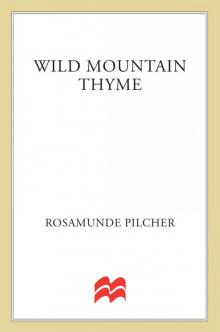 Wild Mountain Thyme
Wild Mountain Thyme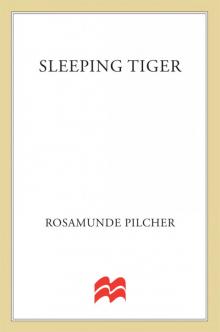 Sleeping Tiger
Sleeping Tiger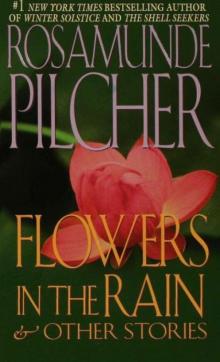 Flowers in the Rain & Other Stories
Flowers in the Rain & Other Stories September
September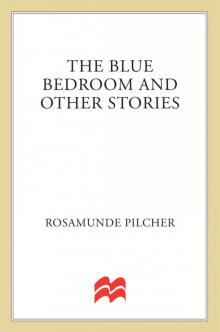 The Blue Bedroom: & Other Stories
The Blue Bedroom: & Other Stories The Carousel
The Carousel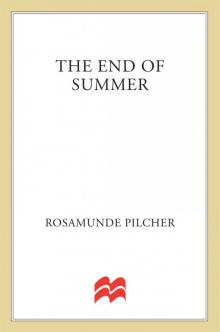 The End of Summer
The End of Summer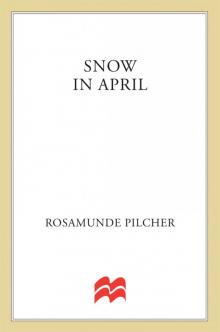 Snow in April
Snow in April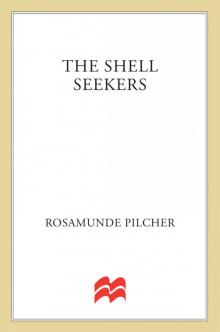 The Shell Seekers
The Shell Seekers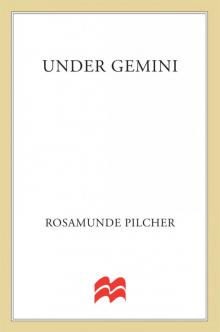 Under Gemini
Under Gemini The Empty House
The Empty House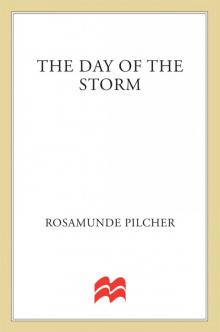 The Day of the Storm
The Day of the Storm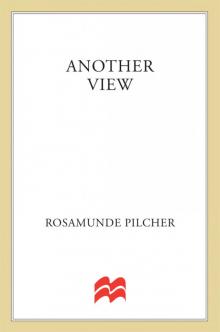 Another View
Another View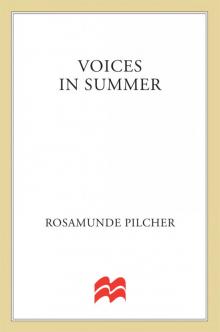 Voices in the Summer
Voices in the Summer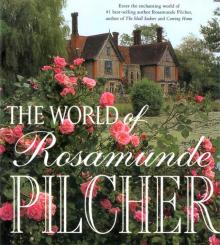 The World of Rosamunde Pilcher
The World of Rosamunde Pilcher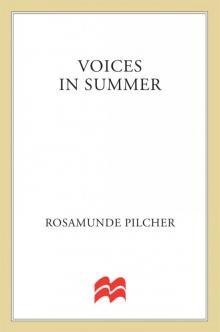 Voices In Summer
Voices In Summer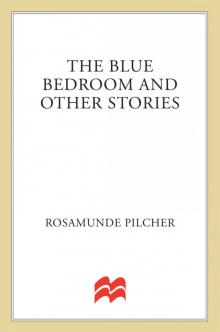 Blue Bedroom and Other Stories
Blue Bedroom and Other Stories